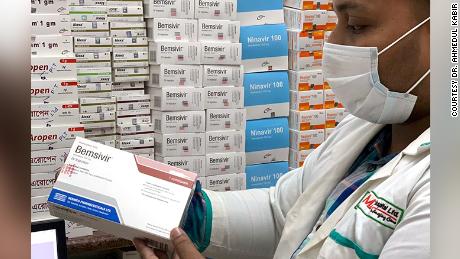But it’s worth noting that Trump is among those at greater risk of severe illness or complications from the coronavirus: He’s 74 years old and is considered obese based on his height and weight. And he takes a statin to help control his cholesterol.
The President had “mild symptoms,” White House Chief of Staff Mark Meadows told reporters Friday. Other people who interacted with him Thursday said his voice sounded hoarse, though some assumed he’d strained it during recent campaign rallies.
Trump will surely receive the best medical care available, but his diagnosis has raised a flurry of questions over what treatment he might receive.
“Chances are the President will make a complete recovery,” said Dr. Leana Wen, a CNN medical analyst and former Baltimore health commissioner, adding that 40% of those who contract Covid-19 develop no symptoms at all and will recover.
“That said, we have a long road ahead of us potentially when it comes to seeing whether he develops symptoms and also whether he comes severely ill,” she said.
So, what could the treatment plan for a 74-year-old man like the President? Here’s what we know.
It depends if a person is symptomatic
When it comes to Covid-19 treatment, it’s critical whether the patient is showing symptoms, like fever, shortness of breath and coughing.
For this virus health care workers focus on “symptomatic treatment,” Wen said.
“You treat the symptoms. If somebody is feeling unwell, they get treatment for that,” Wen said. “But there’s no antibiotic or antiviral that we could be taking at this time. There’s not a pill you could be taking.”
Most patients with mild symptoms can manage the illness at home, and there are no recommended treatments. But they should be closely monitored in case their conditions worsen and they develop more serious symptoms. Some experts have suggested that people who test positive for Covid-19 and are recovering at home might want to consult their doctors about using a pulse oximeter — a medical device that measures the saturation of oxygen in a person’s red blood cells — to monitor their oxygen levels and whether they need more supportive care.
In Trump’s case, it’s too early to know what course the illness will take. Covid-19 can begin mildly, with more serious symptoms sometimes developing after seven to 10 days, said Dr. Esther Choo, a professor of emergency medicine at Oregon Health and Science University.
The incubation period — the time in which someone develops symptoms after being infected — ranges from two to 14 days, Wen said, with an average of about five to seven days.
“After that, it may still take a week or longer to develop a severe illness,” she said.
Overall, “people who are 74, generally have about a 30% rate of hospitalization, about an 8 to 10% rate of ICU stay, about a 2 to 4% mortality, on average,” Dr. Rochelle Walensky, chief of infectious diseases at Massachusetts General Hospital told CNN.
Walensky said that risk factors such as obesity and heart disease place patients at increased risk for serious illness, but it’s hard to predict how multiple risk factors will interact.
“Generally what happens between the first five to 11 days or so, you’ll get headaches, you’ll get muscle aches, feel unwell,” Walensky said, adding that there isn’t much that doctors can do for treatment of outpatients.
“What happens in days 11 to 14, if people are to progress, is that they get progressive shortness of breath, they get sort of respiratory symptoms, and they may present for hospitalization,” she said.
Severely ill patients may require more intensive care while their bodies fight the infection. That might include mechanical ventilation to increase oxygen, or dialysis to combat effects on the body. But those measures don’t treat the virus itself.
Patients can access experimental treatments
The US Food and Drug Administration has not approved any drugs for the treatment of Covid-19.
But there are some exploratory treatments, like the antiviral remdesivir, which is recommended for some patients. The FDA issued an emergency use authorization (EUA) for the drug in May to treat the sickest hospitalized patients.
In August, the FDA issued an EUA for convalescent plasma, which is derived from the blood of patients who have recovered from coronavirus infections, saying the “known and potential benefits of the product outweigh the known and potential risks of the product.”
If necessary, the President could also access Covid-19 therapies off-label under “compassionate use” protocols, said Dr. Paul Offit, director of the Vaccine Education Center at the Children’s Hospital of Philadelphia and an expert in virology and immunology. That means he could be approved to access an experimental product outside a clinical trial.
“I would be surprised if he couldn’t get that,” Offit said, adding that such treatments would be needed only if Trump develops serious or severe symptoms.
“Most of those treatments are for hospitalized patients,” added Dr. Amesh Adalja, senior scholar at the Johns Hopkins University Center for Health Security.
Were Trump to develop more serious symptoms, the first step for treatment “would be simple things like oxygen or intravenous fluids if necessary,” Adalja said.
Beyond that, remdesivir is an option, he told CNN, as is dexamethasone, a type of steroid that’s been given to patients who require oxygen therapy.
“Those are the two that are standard of care,” Adalja said.
Companies have been testing monoclonal antibody therapies — antibodies created in a lab to target Covid-19 — in humans. Some researchers have suggested that this treatment approach could be administered before a person developed symptoms.
But Offit advises people to approach that idea with caution, stressing it can sometimes be unclear when exactly a person was exposed to the coronavirus.
“If you look at the data, if you give it within the first two days of exposure, you can protect people from getting sick,” he said, “but if you give it after that, you probably can’t.”
Walensky, of Massachusetts General Hospital, added that the biotechnology company Regeneron recently shared some promising results of initial tests that show its antibody cocktail may reduce levels of the virus and improve symptoms in Covid-19 patients.
The therapy does not have emergency authorization from the FDA, but can be accessed through the company’s compassionate use program, or through a clinical trial. However, patients in a trial don’t know if they have received the drug, or a placebo, which does nothing.













